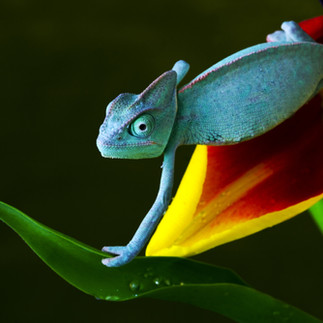
Chameleons: Nature's Hidden Heroes in the Garden
- TJ Maposhere

- Jan 7, 2024
- 3 min read
When it comes to gardening, we often focus on the colorful flowers and lush greenery that bring our outdoor spaces to life. But have you ever considered the importance of chameleons in your garden ecosystem? These fascinating creatures, known for their unique ability to change colors and adapt to their surroundings, play a crucial role in maintaining the balance of nature. In this article, we will explore the significance of chameleons and why gardeners should appreciate and protect these incredible creatures.
Species Diversity and Distribution
The world of chameleons is both diverse and geographically widespread. With approximately 200 species, nearly half of them are found in Madagascar, with many others inhabiting regions of Africa and parts of Asia. This suggests that these adaptable creatures have successfully adapted to diverse environments, making them potential allies for gardeners across the globe.
Panoramic Vision and Hunting Skills
One of the most captivating aspects of chameleons is their unique eyesight. With unparalleled panoramic vision and the ability to move their eyes independently, chameleons become exceptional hunters. Their remarkable vision helps them spot and capture insects that often plague gardens, including mosquitoes, flies, spiders, and even harmful crop pests. As a result, these little reptiles act as natural pest controllers, making them every gardener's friend.
Colorful Adaptations
Chameleons are renowned for their intriguing ability to change colors. Contrary to popular belief, they do not change color to camouflage themselves but instead use this adaptation for various purposes. Temperature regulation is one of the key reasons behind their color-changing ability. By going darker, they can absorb and retain more heat, allowing them to warm up in colder weather. Additionally, chameleons change colors to communicate their mood, attract mates, or intimidate rivals, making this adaptation an essential part of their social and survival strategies.
Defensive Mechanisms
When chameleons feel threatened, they display an array of remarkable defensive mechanisms. One notable behavior includes hissing and inflating their bodies to appear larger, deterring predators and potential threats. Other species have the ability to flatten their bodies, making them less conspicuous and more difficult to spot. These defensive strategies are crucial for their survival and highlight the incredible adaptability of these small reptiles.
Conservation Concerns
Unfortunately, due to the loss of their natural habitats and increasing urbanization, many chameleon species are now endangered. Destruction of their habitats through deforestation, pollution, and the growing illegal pet trade has led to a significant decline in their populations. It is our responsibility as gardeners and nature enthusiasts to protect and conserve these valuable creatures.
Promoting Healthy Gardens
Chameleons are an integral part of a healthy garden ecosystem. They help control the population of harmful insects, reducing the need for synthetic pesticides and herbicides. Excessive use of these chemicals not only harms chameleons but also disrupts the overall balance of the ecosystem. By limiting our reliance on such synthetic substances, we create a safer and more sustainable environment for these helpful creatures.
Chameleons, with their stunning adaptations and unique characteristics, bring an element of intrigue and wonder to the natural world. Their ability to control pest populations makes them invaluable allies for gardeners worldwide. However, the current threats they face necessitate our active involvement in preserving their habitats and adopting eco-friendly practices in our gardens. By appreciating and protecting these little marvels, we can ensure a harmonious coexistence with nature for generations to come. At Kwaedza farm we recognize the importance of chameleons in our farming ecosystem and they are an integral part of Integrated Pest Management techniques.












I am sorry to report that no one in my household is able to read your article; it has to do with the color and lightness of the formatting font used.